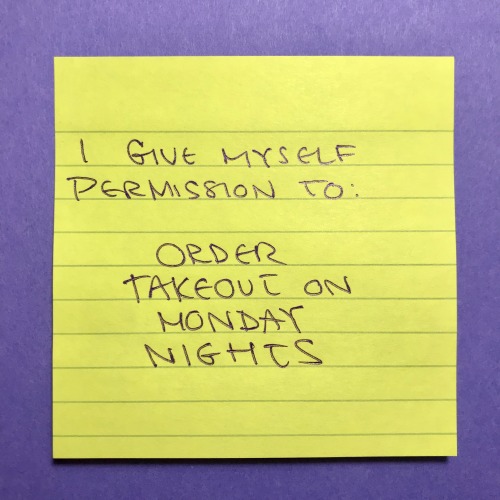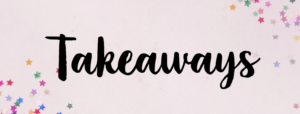Prioritization is really just choosing to do one thing and not another.
Sounds so simple when you put it that way, huh? Don’t worry, my fellow recovering workaholics, mental illness-experiencers, and super busy pals: I of all people understand how daunting making a decision can feel. When we begin to feel the burden of decision making, one of the best things we can do is to give ourselves permission to make a choice that is in our best interest in the current moment.
Keep reading, dear ones, and I’ll show you how it works.
The Burden of Transition
One of my current daily practices is giving myself permission to choose to unburden myself.
I struggle with transitions, and over the last few months I have been worrying about changes that will happen later this year, next year, and beyond. I have some big goals on my horizon: moving homes, finishing a dissertation, starting a business. Despite my best intentions, I tend to go from zero to freak out when I consider all the “what ifs”: what if my consulting boss doesn’t have budget to renew my contract next year, what if I don’t get XYZ number of coaching clients, what if I struggle with finishing my dissertation in time, what if my new commute makes my pain flare up? Suddenly, what started as planning for my future has morphed into spinning out under the burden of worrying about how things I can’t possibly predict or know will pan out.
So how can I choose to unburden myself?
Permission Slip
Vulnerability researcher Brené Brown talks about writing herself a literal permission slip in her book Braving the Wilderness: The Quest for True Belonging and the Courage to Stand Alone and in her LifeClass conversation with Oprah. The point of Brown’s note was to encourage herself to make choices that she wants to make without fear of vulnerability, looking dumb, or otherwise failing.
Here’s a permission slip I wrote for myself as I was revising my 1.13 post on Perspective, which was actually a year ago from this week:

Here’s what I wrote in that post: “Every Monday evening I grumble about spending time and energy cooking while I’m revising my blog post, and giving myself permission to just order takeout instead will A) give me a fresh air/walking break mid-revision, B) reward my hard work with something delicious, and C) will allow me to enter into next Monday’s blog revision without worrying about food plans.” This permission slip lives on the wall in my office, and although I usually have my weekly post finished before Monday evening nowaways, I still give myself permission to get takeout when I’m on a deadline.
Permission to Relax
Below, I walk you through two challenging things that trip us up and show you how to give yourself permission to cope with them.
Future-tripping
Blogger Greg Weber describes future-tripping in his HealthyPlace article, “Avoid Future-tripping When You Have Anxiety”:
Future-tripping, also called anticipatory anxiety, is part of the human condition of peering into the imagined future and anticipating the outcome. Everyone does this to some degree or other. It’s one of the blessings (or perhaps curses) of having a human brain with a frontal cortex. A person without an anxiety disorder may see a pleasant outcome, while an anxious person will likely imagine the worst outcome possible.
When we future-trip, we freak ourselves out (and even have anxiety attacks or flashbacks) worrying about things that might never happen. This is what I call “spinning out.”
Future-tripping is the opposite of mindfulness. For that reason, my first step in giving myself permission to remove the burden of future-tripping is to practice mindfulness. Here’s what that looks like for me:
- Acknowledge (ideally out loud) to myself that I am future-tripping.
- Take five deep breaths.
- Check in with my senses. What are five colors and shapes I can see?
- What do I hear?
- Can I feel my feet on the ground? Can I relax my shoulders?
- Do a body scan.
- Take five deep breaths again.
These practices help me to calm my central nervous system and ground myself in the present moment when I start to spin out. Once I have done some of them (especially the breathing and naming shapes/colors/sounds), it is much easier for me to focus on the present moment and not feel anxious about the future.
Dealing With Triggers
Triggers are things that activate negative or adverse responses. Each person has individual triggers, and it is up to us to advocate and care for ourselves when we encounter them. There are current debates in academia about the benefits and supposed risks of including trigger and content warnings in course material or discussions. As someone who lives with Complex PTSD and is a survivor of abuse and addiction, I am 100% pro trigger warning, because I know they help me to function and feel better. Sometimes, triggers catch me by surprise, and I need to rely on my toolkit for calming my central nervous system and grounding myself. Other times, I have foresight that content might trigger me. When that happens, I give myself permission to skip over the content.
Here is an example. Last week, I listened to the “OnBeing” interview with my favorite poet, Sharon Olds. When the interviewer, Krista Tippett, asked Olds to read a particular poem that was about rape, I decided to fast forward through the reading. Do I love Olds? Hell yeah. Do I appreciate and value art and poetry about important topics like sexual violence? Also hell yeah. However, I still chose not to listen to the poem, because I was not willing to encounter even the possibility of a flashback or discomfort.
I work very hard in therapy and in my daily practice to heal from trauma, and I have the privilege of having some control over my experience with challenging emotions. For example, I practice setting boundaries and asking for what I need, even though those acts can feel scary sometimes, because doing so helps me heal from fear of abandonment. Giving myself permission to not engage with a potential trigger does not diminish my commitment to healing and developing resiliency.

In lieu of a writing or reflection prompt this week, I thought instead I would point you to examples of different ways you can give yourself permission to unburden yourself.
Below are all of the times I’ve practiced giving myself permission so far in The Tending Year. Each example includes a quote, names the context, and links to the post, so you can go back and read the post and try out tools to help give yourself permission.
Ways I Have Given Myself Permission in The Tending Year
1.5: Mindful Production: Set boundaries around output
“The 90-minute session method is helpful especially for making myself write anything for my dissertation, and then giving me permission to put it away for the day.”
1.10: Conscious Input and Output: Monitor your mood and output
“I also ended up writing notes to myself at the bottom of each day’s column, such as ‘don’t be scared to do fun things’ and ‘when I know how much blank space I have in a week I can give myself permission to relax.'”
1.14: Focus: Shift your perspective on perfection
“When I’m feeling imposter syndrome or feeling nervous that I’m not good enough or smart enough to do a particular thing, I tell myself to Fake It Until I Believe It, which is me giving myself permission to just start the damn thing and go for it like I am already a pro (versus not going for it at all because I feel like a dummy).”
1.16: Enjoy the Process: Resee through a strengths-based perspective
“Instead of telling myself I did poorly because I didn’t revise my entire prospectus on Monday, I gave myself permission to re-see the situation. Instead of saying, ‘Ugh, I didn’t revise enough today,’ I said, ‘I read four articles and took notes that will help me write my dissertation, and I also started incorporating these into my footnotes and citations. This is really helpful because it provides a foundational theory and language for my discussion of my methods.’ I felt more prepared, and the results definitely showed in my revisions.”
1.23 Workaholic Tendencies: Adjust Your perspective on what is “good enough”
“After a week of working very hard, I knew I didn’t want to run myself into the ground at the conference last weekend. There were so many delicious panels to go to and so many people to network with, so I struggled not to feel guilty for taking breaks. But I gave myself permission to attend just one panel a day and network with one person a day, and I hit those goals.”
“My reiki practitioner, Anna Joy, encouraged me to write an affirmation to encourage myself to prioritize self care. I came up with this, which I am telling myself every day: “I give myself permission to see taking care of myself as productive.” Some people may prefer to separate the concept of productivity from self care, but it works for me (at least right now) to connect them.”
2.8 Batchotasking: Know when to stop on a work project
“When you finish your batchotasking session, put that task back on the shelf for the day or the week. If you monotasked, focused, and tried your best, then you’ve done everything you can, AKA you did a good job! Give yourself permission to leave that task within its batchotasked boundaries, check it off your must-do list, and move on to your other batched monotasks…which includes things like hanging with friends without checking work email on your phone! You deserve it, tenderheart.”
2.9: Why You Should Aim for “Good Job”: Set reasonable and realistic goals
My goal for the month is to write 7,500 words. My stretch goal is 10,000 words. In last week’s post on batchotasking I reported that I’d hit 61% of my stretch goal for my dissertation chapter, or 82% of my original goal. This week, I’m golden: hitting not only my goal of 7,500, but surpassing the 10,000 word stretch goal, too.
How did I do it? By working smarter, not harder. And by giving myself permission to do a good job at reaching the original goal I set out to accomplish: a 7,500 word raccoon report of my dissertation chapter. I know that the hard work of revision awaits me, but I feel prepared to take on the challenge with confidence and curiosity!
2.11: How to Revise (part 1): Focus your energy on an achievable goal
“Once you know what the purpose is for your particular revision, give yourself permission to put off anything that will distract you from the goal at hand. This will help to limit overwhelm and will give you a roadmap for doing a good job at THIS draft.”
Newsletter
Sign up below to access my free newsletter, Tending with Dr. Kate Henry.

